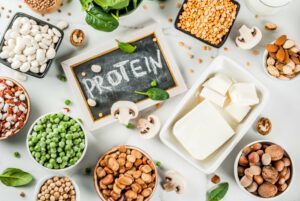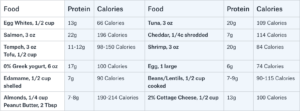
Reaching Protein Goals without Meat
Lisa Balestrino MS, RD, LDN & Kaitie Yeoman RD, LDN, CDCES & Anne Till, MNutr., RDN, LDN
Protein is necessary for building muscle, bone and other tissues. However, some research has linked regular consumption of red meat to a number of health problems, such as heart disease, some cancers, kidney problems, digestive issues, and mortality. For this reason health practitioners are advising people to eat less meat and meet their protein goals using other food sources. If you’ve met with any of our dietitians/nutritionists at the practice, you’ve definitely heard us talk about prioritizing protein when it comes to healthy eating habits. In this blog post we will share some great alternatives to chicken and meat to ensure you meet your protein requirements.
First things first, how important is protein?
Protein is essential – in nutrition that means that the human body has to have it to maintain health and to function optimally. The “building blocks” for protein are called amino acids and some of these amino acids have to come from the food you eat as your body is unable to create or manufacture them itself. Some additional handy information about protein: adequate intake supports appetite control, stable blood sugar levels, as well as maintenance of healthy muscle mass and immune function. Amino acids are also important component of hormones, enzymes, and neurotransmitters like serotonin and dopamine – all very helpful in allowing the body to function optimally.
Where do I get protein – what foods are good sources?
When people think of protein, they often think of eating meat. It is true that meats like chicken, turkey, beef and pork are indeed excellent sources of protein and what we call highly bioavailable – or readily available to use by the body. But protein is an important nutrient found in many other different types of food too. There are many options besides chicken and other meats that are good sources of protein such as eggs, dairy products, fish, seafood and plant based proteins such as beans, tofu, tempeh and nuts. Some of these foods and their protein content per serving are given in the chart below.

How much protein do I need?
You may be wondering how to determine how much protein you need each day. Protein requirements will vary from person to person based on individual characteristics like: body composition, height, weight, gender, age, health conditions and sporting performance goals. You can estimate your general protein requirements by multiplying your weight in pounds by 0.5-0.7g to find your estimated daily protein goal in grams. For example, a person weighing 150 pounds would have a goal of 75-105 grams of protein daily. Since individual protein needs can vary widely it is difficult to communicate a precise protein goal for each person via a blog post, but this guidelines will definitely ensure you meet the goal of an adequate protein intake. Because determination of individual protein requirements needs to take into consideration so many factors, if you want a more specific goal it is a good idea to work with a dietitian.
To apply a more simple yet useful approach, you can also use the “plate method” for balanced meals while ensuring an adequate protein intake. . The “plate method” is a straightforward template where each meal includes a protein-rich food (consider examples from the chart above) that takes up about 1/4 of your plate to ensure a good balance and adequate protein intake.

What do I do with this information?
We want you to prioritize protein – it’s not the only important part of a balanced diet, but it is key. Aiming for at least 20 grams of protein per meal is a good ballpark. We shared a social media post previously about the amount of food it takes to get to 30 grams of protein – look closely at those serving sizes (some foods are much more protein dense than others – and some foods are richer in fat or carbohydrate than protein). Ultimately all of these foods can be part of a healthy balanced diet, but balance is the key word to get the nutritional benefits. Choosing lean proteins most of the time is the easiest way to strike that balance.
Do you need some inspiration? Consider these ideas.
High Protein Lunch Ideas that don’t rely on meat
Tuna and Salad
Use a 4 oz. can of Tuna, drained and added to a leafy green salad with chopped peppers, cherry tomatoes and cucumbers. Add a chopped boiled egg and 1/2 Cup red beans. Use a reduced fat dressing of choice (one that contains dill will pair well).
Smoothie Lunch on the Go
Blend together : 5 oz. Greek Yogurt, 1 Scoop Protein powder of choice, 1/2 Cup Ultra Filtered Milk, 1/2 Ripe Banana, 1 Cup Frozen Berries and a handful of spinach (optional)
Vegan Burger
High Protein Vegan Burger Patty, High Protein Bun, lettuce, pickles, sliced tomato.
Breakfast for Lunch
2 Egg Omelette with Asparagus and Goats Cheese, served with a side salad and lite vinaigrette.
Make your own protein box
1/4 Cup Almonds, 1 Cheese Stick, 1 Boiled Egg, 1/4 Cup Hummus, Vegetable Crudités (Baby Carrots, Red Pepper Slices, Baby Cucumbers)
Protein Snack Ideas that don’t rely on meat
1/2 Cup Cottage Cheese & 3/4 Cup Chopped Pineapple OR 3/4 Cup Mixed Berries
OR
2 Tbsp. Almond Butter and 1 Sliced Sweet Apple
OR
Mini Parfait: 5 oz. Greek Yogurt, 1/4 Cup Almonds and 1/4 Cup Blueberries, sprinkled with cinnamon.
OR
1/2 Cup Edamame Beans – these can also be roasted and stored for later use
OR
Home-made “protein bar” or “protein balls”
Our Dietitians/ Nutritionists are here to help you and our office is open. Most major health insurance companies are also covering telehealth visits, usually at no cost to you. Our office will verify your benefits for you – both for existing patients and new patients. Navigating meals and snacks is an essential part of managing your health. Let us help you figure out how to use this information and support you in your various goals!
Click here to contact us for more information.
If you enjoyed and benefited from this information, please like and share it.
Yours in health and wellness,
Lisa Balestrino, MS, LDN, RDN & Kaitie Yeoman, RD, LDN, CDCES & Anne Till, MNutr., RDN, LDN
Categories
Call Us Today: 919-990-1130





